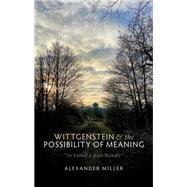Wittgenstein and the Possibility of Meaning "To Follow a Rule Blindly"
, by Miller, Alexander- ISBN: 9780192856487 | 0192856480
- Cover: Hardcover
- Copyright: 11/15/2024
Wittgenstein and the Possibility of Meaning develops a new, non-reductionist, response to the sceptical argument about meaning famously developed in Saul Kripke's book Wittgenstein on Rules and Private Language. Inspired by Ludwig Wittgenstein's later philosophy, it begins by outlining an intuitive notion of following a rule, explaining its relationship to the notions of linguistic meaning and intentional content. It then gives an outline and development of Kripke's Wittgenstein's sceptical argument, going into detail on the arguments against reductive dispositional accounts of meaning. It also explains Kripke's Wittgenstein's objections to non-reductionist views which take semantic and intentional facts to be primitive and sui generis and argues against views (such as error theories and forms of non-factualism) which attempt to respond to the argument by conceding that there are no meaning facts. The position advocated in the book emerges from a response to recent arguments developed by Paul Boghossian ("The Inference Problem") and Crispin Wright ("The Minor Premise Problem") which appear to imply that rule-following and competent language use are impossible. The arguments of Boghossian and Wright are then blocked via a new account of Wittgenstein's remarks on the notion of "following a rule blindly" or "blind rule-following" that connects it to the Wittgensteinian idea that there is a way of following a rule that does not involve interpretation. In turn, this is used to generate a response to Kripke: understanding an expression is a matter of having an intention to exercise one's ability to use it in accord with its meaning or correctness condition.






